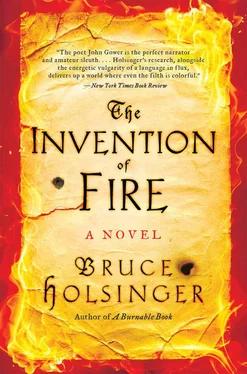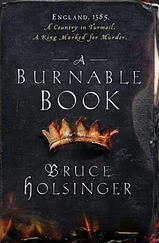Bruce Holsinger - The Invention of Fire
Здесь есть возможность читать онлайн «Bruce Holsinger - The Invention of Fire» — ознакомительный отрывок электронной книги совершенно бесплатно, а после прочтения отрывка купить полную версию. В некоторых случаях можно слушать аудио, скачать через торрент в формате fb2 и присутствует краткое содержание. Год выпуска: 2015, Издательство: HarperCollins, Жанр: Исторический детектив, на английском языке. Описание произведения, (предисловие) а так же отзывы посетителей доступны на портале библиотеки ЛибКат.
- Название:The Invention of Fire
- Автор:
- Издательство:HarperCollins
- Жанр:
- Год:2015
- ISBN:нет данных
- Рейтинг книги:3 / 5. Голосов: 1
-
Избранное:Добавить в избранное
- Отзывы:
-
Ваша оценка:
- 60
- 1
- 2
- 3
- 4
- 5
The Invention of Fire: краткое содержание, описание и аннотация
Предлагаем к чтению аннотацию, описание, краткое содержание или предисловие (зависит от того, что написал сам автор книги «The Invention of Fire»). Если вы не нашли необходимую информацию о книге — напишите в комментариях, мы постараемся отыскать её.
The Invention of Fire — читать онлайн ознакомительный отрывок
Ниже представлен текст книги, разбитый по страницам. Система сохранения места последней прочитанной страницы, позволяет с удобством читать онлайн бесплатно книгу «The Invention of Fire», без необходимости каждый раз заново искать на чём Вы остановились. Поставьте закладку, и сможете в любой момент перейти на страницу, на которой закончили чтение.
Интервал:
Закладка:
She shrugged heavily. “Was his own peril seemed to be more on his mind.”
“How so?”
“Kept looking over his shoulder, like the guards’re listening to his every breath,” she said.
“What about the pardon? Did you hold it out to him?”
“Aye, that I did. Didn’t seem to move him, not that I could see.”
Her news was not as bad as it would have been an hour earlier. If all went according to plan, Snell would be exposed at Westminster along with Gloucester, so penetrating the Tower was no longer as crucial to subverting their treachery. Yet Snell’s wanton violence and trade in arms remained a distinct threat.
She moved a hand up to rub at her chin. “Was only one bit he said that seemed peculiar.”
“What was that?”
“Told me the Tower wouldn’t let him out even for the Riding.”
“Surely not a surprise, given his circumstances.”
She shrugged. “That’s why I thought it strange, Master Gower. He said it again, right before he was taken back down. Said it heavy, like he wanted me to hear him well, as if it were a message. ‘Not even for the Riding,’ he said.”
“He said this in the hearing of the guards?”
“Aye.”
“And how did he seem when you left him, mistress?”
She said one word. “Afraid.”
Chapter 40
Stephen could scarcely bring himself to lift his mallet, nor bend a sheet of steel, nor even stir the coals at the foundry forge, so weary were his arms. He looked out at the Tower yard, the ordered chaos of coming war. The serpentine guns had been completed at Snell’s orders, and now the armory’s attention had turned back to the necessities of the coming battle. Twenty London armorers had been ordered within for the week, their wares spread out on the ground. The business of the day was jack-of-plate, more of the rough outfits than he could have imagined possible. Small iron squares cut from hammered sheets, each awl-punched with a single hole, then laced together between two layers of cloth to form a sleeveless hauberk, using undyed wool brought in by the bolt from the clothiers’ shops along Broad Street and Cornhill. No refinement in this craft, no art, no clever joints to lessen the weight, as on the armor of knights and lords who could afford such contrivances. No plates for the shins, the feet, the neck, the arms; no couters for the elbows, no poleyns for the knees.
This was infantry armor, scalloped in unsubtle layers up the front with nothing in back, and rough-hammered helms to go on top. Naught fancy or newish, London’s armorers had been warned by Snell. Efficiency and numbers. Those are your orders. They obeyed, the pieces fastened together with old leather thongs cut from worn harnesses and even their own discarded aprons. The goal was quantity, armor to suit five thousand men, perhaps ten, depending on how much time remained before the French invasion from Sluys.
The worst part was outfitting the horses-not the knights’ shining war mounts, but the laboring beasts charged with hauling the wheeled engines and gun carriages into the front ranks. Again, nothing subtle or polished or painted, just raw plates of sufficient thickness to stop an arrow or bolt whistling from above, a few rivets where back met neck. Hundreds of them, each to be encased in dull sheets of hammered iron, huge swaths of it, bent over neck, back, and rump, all to save the hide of a mute and fear-shitting beast.
Never had Stephen seen such a mass of men toiling over the same sorry tasks, never had he witnessed such a waste of talent and industry in the service of slaughter. He knew many of the armorers and their apprentices, had seen the cleverly wrought suits of plate and chain they were capable of crafting for knights and higher lords. And he knew and admired the work of Stone’s rivals in the founding trade, the melodious bells poured, bored, and sounded to every house’s version of perfection.
No longer. Now that the serpentine guns had been completed Stephen was merely one of two dozen metalworkers muling for the Tower armory, hammering steel and iron as a scullery maid peels carrots and roots. Half of London’s smiths pulled from the clever art of gates and grilles, their precision work sacrificed to the cause of war and its blunt instruments. Now all these crafts had been intermingled, with none of the beauty and subtle art that distinguish the mysteries of metal each from the other. In the Tower of London, it seemed, England’s metalworkers had become no better than slaves.
As for Stephen? The softer sort, as Snell had branded him. He wondered if that was how the world saw him, as a weak and pliable man. Yet not everyone thought him soft, he assured himself. Not Hawisia Stone. Think on your iron and your steel and your bronze, and you will find your strength, she’d told him. It was those words that had inspired him to risk those final hints to his mistress. Had she comprehended their meaning? And even if she had, would there be time to use them to any effect? The new mayor’s Riding was now two days away, and as he watched the teeming work in the armory he felt a new despair. He wanted to believe the clouds would clear and all of this go away with them, that he would escape the dark vision of these last weeks to find himself pardoned, relishing his freedom, even working contentedly for Hawisia Stone and serving out his sentence with proper contrition for what he had done. Yet what could a pregnant widow hope to accomplish against the malignant force of the king’s armory?
The cooks’ shouts rang across the yard, signaling the midday meal for the Tower’s companies of laboring men. They poured out from every corner of the compound, carpenters and masons, armorers and smiths, farriers along with the stableboys and numberless others, lining up at the kettles to receive their food and ale. The men sprawled wearily along the wall with their meals, hollow trenchers of water-thinned cream mixed with oats and barely warmed.
As Stephen choked down another bite of the tasteless gruel William Snell appeared among the forges.
“Marsh,” he called out, beckoning him over. Stephen trudged to his master’s side.
Snell led him beneath the awning of the gun shed, where the hundred barrels and stocks Stephen had made stood by the tens.
“Your little snakes will be put to use soon, Marsh, and quite memorably,” the armorer said, looking out over his arsenal. “Be sure all is prepared. By tomorrow night I want you to check every one of these handgonnes. Every barrel, every stock, all the pans and chambers, inspected by your hand alone. The serpentines especially. The guns must be in firing order. Cleaned, scraped, greased, tightened-whatever you must do to make them ready. Is that understood?”
Stephen looked out past the cooks’ tables and over to the wall, where the king’s lion had collapsed. He saw the other deaths he had made, the flesh ravaged by his craft. The flaming arm of Robert Stone, the ruined neck of a country maiden. And in that instant, as Snell waited for his underling’s reply, Stephen knew his greatest work still lay before him.
“I shall check them, Master Snell,” he said, his voice ringing as clear as Stone’s finest bell. His work-bent spine straightened with the challenge. “I shall check every last one of them. You may depend upon it.”
Chapter 41
The presence of Brembre’s guards, rough and rude city soldiers stationed in the yard and patrolling along the walls and adjoining alleys, had created a minor stir at the priory. St. Mary Overey was not accustomed to the presence of armed men on its grounds, and the prior himself had dropped by my house to air his tentative but sincere concern. The Order of St. Augustine is an order of peace, Master Gower. Our canons are men of the quill, not of the sword. A promise of generous compensation calmed his clerical nerves. The men’s habitation at the priory would be temporary, I assured him, their presence the result of a misunderstanding soon to be resolved.
Читать дальшеИнтервал:
Закладка:
Похожие книги на «The Invention of Fire»
Представляем Вашему вниманию похожие книги на «The Invention of Fire» списком для выбора. Мы отобрали схожую по названию и смыслу литературу в надежде предоставить читателям больше вариантов отыскать новые, интересные, ещё непрочитанные произведения.
Обсуждение, отзывы о книге «The Invention of Fire» и просто собственные мнения читателей. Оставьте ваши комментарии, напишите, что Вы думаете о произведении, его смысле или главных героях. Укажите что конкретно понравилось, а что нет, и почему Вы так считаете.












